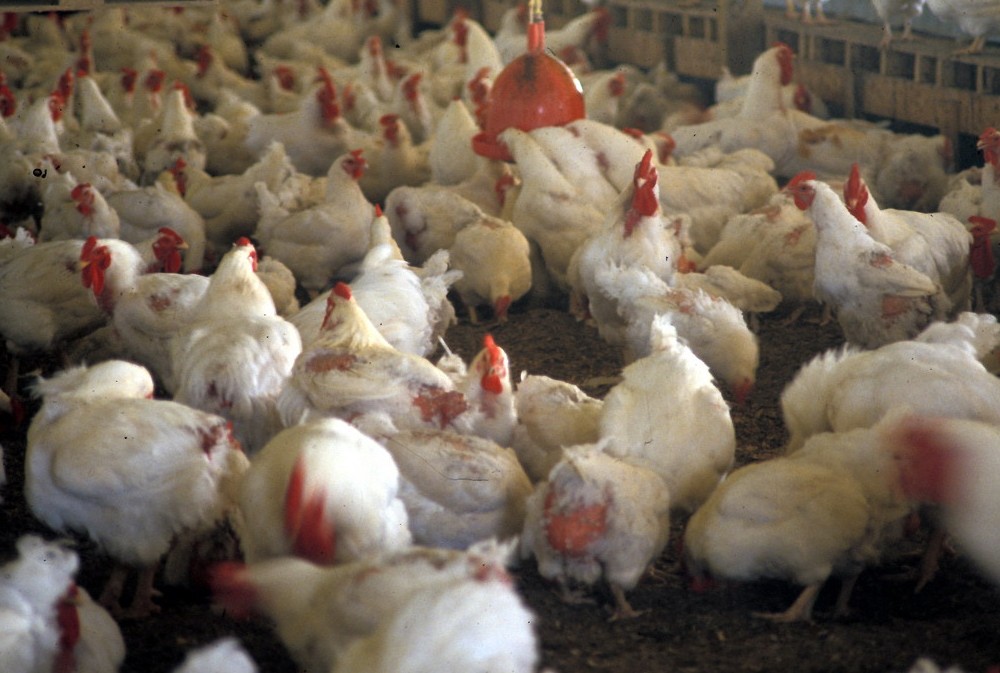By Daniel Menefee
For Maryland Reporter
With no help from their state representatives, some residents of the lower Eastern Shore have sought help from a Montgomery County Democrat to address health problems blamed on an explosion of large poultry operations.
Respiratory problems have been linked to ammonia, hydrogen sulfides and particulates venting from rows of large industrial fans in chicken houses. Large poultry operations have increased dramatically in the last decade, according to residents who testified in Annapolis on Tuesday.
Sen. Richard Madaleno, D-Montgomery, is sponsoring the Community Healthy Air Act, a bill that would require Maryland Department of the Environment to determine if the agency, and large scale poultry operations, are in compliance with Clean Air Act standards — specifically pollutants from concentrated animal feed operations, or CAFOs.
One-year study called too short
The one-year study would require MDE to monitor air quality near poultry operations, but Delmarva Poultry Industry, Inc., a nonprofit that represents chicken growers, says the one-year study would not be long enough to yield accurate results and questions “whether MDE has the money and expertise to do what this bill will require.”
“CAFOs can be significant sources of air pollution,” said Brooke Harper, chair of the Maryland-NAACP Environmental Justice Committee, before the Senate Education, Health, and Environmental Affairs committee on Tuesday. “Exposure to airborne contaminants have been associated with adverse health effects such as asthma and other respiratory illnesses.”
Harper said the required study under the bill, SB773, would help determine if Wicomico County’s 100 chicken operations are a cause of Maryland’s highest rates of lung and heart disease. She said Wicomico also has the highest rates of emergency room visits due to asthma.
Somerset County resident Sam Burley told the committee his quality of life has drastically changed since six chicken houses went up 240 feet from his home. He said the operation houses 275,000 birds and his property value has dropped dramatically.
“No law abiding citizen would think of going to his next door neighbor and taking something of value, but effectively that has happened to us,” he said.
He said he could smell chicken waste inside his home.
Chicken house dwarfs home
Somerset county resident Lisa Inzerillo showed the committee an aerial photo of her house dwarfed by a chicken house.
She said she asked her local officials to help zone the “Walmart style complex” away from her small farm, but instead saw officials giving deference to the poultry industry.
She said the study would go far in determining the health impacts of chicken houses.
“We are not trying to do away with the poultry industry, but it is time they started respecting our right to clean air,” she said.
She told the committee that bio-filters on exhaust fans is widely used in Europe and would help mitigate much of the pollution from chicken houses.
Michelle Protani-Chesnick, a Wicomico County chicken farmer, said she was a responsible steward of her farm and has raised a family on her poultry farm with no adverse health issues to her family.
“We don’t have health related poultry problems,” she said. “We should be violently ill constantly and we’re not.”
Protani-Chesnick said she was concerned the study would not be done properly.
“You would really need to do a much longer [study] on more than just one farm to get an honest result,” she said.
Delmarva Poultry Inc., a nonprofit group that has represented the chicken growers since 1948, agreed that the results of a one-year study would mostly likely be inconclusive.
“Incomplete, inaccurate, and poorly gathered data could lead to conclusions that could impact how growers operate their farms,” the nonprofit said in a press release on Feb. 22. “These conclusions could lead to additional state environmental requirements. If a study is to be done, it needs to be done right and this bill, we believe, will not produce accurate results.”
They noted that the bill’s sponsor was not from the Eastern Shore.
Dan Menefee can be reached at dcmenefee@atlanticbb.net





Recent Comments